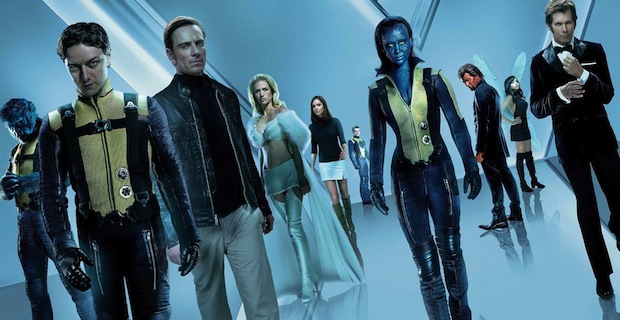
Written by UTG critic Grace Duffy, Scene & Heard takes a look at the music that makes our favorite films so memorable. Whether it’s the 400-piece orchestra Christopher Nolan used for The Dark Knight, or the dozen or so bands that contributed to the soundtrack of Top Gun, there is no denying the impact music has on movies and this column hopes to highlight the best of the best.
If you have a suggestion for a film we should cover on Scene & Heard, please contact us by emailing utgjames@gmail.com.
Those of you who read my review earlier in the year will know that I was somewhat appreciative of the latest X-Men film, X-Men: First Class. While I have come across mixed reviews elsewhere, for me it was a cinematic triumph, which managed to capture all the fun and easygoing spirit of the first trilogy and add a heady dose of spectacle, warmth, and color to the series. It almost managed to wipe away the horrible aftertaste left in the wake of Wolverine a few years ago, but I think that day will only truly come when Gambit is finally given the onscreen representation he deserves. For me, at least.
Multiple elements contributed to the overall success of the film, but as detailed before, a winning score is pivotal in adding the finishing touch to a glossy production and this is no exception. The score, composed by Henry Jackman, is a gorgeously inventive affair that mixes and matches its sounds to properly serenade the varying experiences of the characters. It’s led by a masterly basic theme, simply titled “Theme,” that uses a frenetic and exhilarating string refrain to evoke images of awe and anticipation and set the story in motion in style. As it progresses, Jackman mixes in a heavy bass line and solid percussion to echo the film’s darker edge, hinting at all the boldness and malevolence brimming beneath Erik Lensherr’s determined surface. Something in this second act show of attitude also conveys the willfulness and defiance of Xavier’s not-yet-christened X-Men, lending a resolute foundation to his ardor and their dedication. It has something of the hip swagger of the 60s too, completing the effective rendering of the era in which the film’s events are set.
Some of the score’s best moments are, unsurprisingly, reserved for Lensherr and his gradual evolution into Magneto. The darkness that courses through the would-be revolutionary is intoxicating, and his theme equally so – something dangerous, calculating, borne of horror and verging on horrific itself. The tracks that accompany his pursuit of his Nazi tormentors – “Pain and Anger,” “Not That Sort of Bank,” and “Frankenstein’s Monster” – reflect the escalating wrath spurring him on. The strings are furious and insistent, emotionless yet harrowing, building and building on the same repeated notes as the reckoning draws closer. Crucially, they never change their basic structure – perhaps echoing the impassiveness of Magneto himself and his one-track bid for vengeance. It defines and consumes him as he ticks name by name off a bloodstained list. Yet, his music is not one-dimensional – “Rage and Serenity” draws on some of his latent humanity to mirror the pain and hardship which led his powers to manifest, and the moment of inexorable triumph when, with Charles’ help, he begins to realize the true extent of his abilities.
Similar glimpses of tenderness and vulnerability are evident in “Rise Up to Rule” and at times in “Cold War,” the latter in particular acting as a stirring portrait of the harrowing reality in the rest of the world. The music mixes this evocative edge with something more urgent and even frantic as two rival governments begin to lay plans that could culminate in the destruction of life as we know it. “To Beast or Not To Beast” is also a poignant affair, illustrating Hank’s desperate struggle with his mutation before a sonic onslaught of horror derides his ill-fated attempt to look like everyone else.
The concentrated, methodical rhythm of “X-Training” with its heavily programmed electronics is the first hint as to the bombast one can expect as everything culminates in battle. “Let Battle Commence” is harried and intrepid, the first track since the opener to call upon the film’s main theme as Xavier’s nascent X-Men unite for the first time. The gravitas of the battle and the tension as two governments blindly grapple with a power beyond their comprehension, willfully and idly risking the safety of the world they’re sworn to protect, is brilliantly conveyed in the ethereal elements that appear in “Sub Life” and “Coup d’État.” The former uses a choral effect to reflect the godlike extent of Magneto’s powers, while the latter adds it to a stirring refrain that freezes the brief, sordid moment when the military turn on their saviors. It adds a striking and otherworldly majesty to this glimpse of megalomania run wild and the unseeing intolerance with which they regard the mutants.
Jackman’s music for First Class is as fresh and dynamic a take on the genre as the film itself, with all the excitement and anticipation the latter entails to boot. Even if you’re not a soundtrack person, the swagger and breathtaking rush of the music on this ought to appeal to you, managing as it does to imbue the classics with a bit more bite. I sincerely hope there’s more where this came from, and I’ll happily have another trilogy along these lines please.
- 2015’s Most Underrated Films - December 29, 2015
- Passing The Torch: The End Of An Era For UTG - December 1, 2015
- UTG PREMIERE: Before The Streetlights – “Private Browser” - November 26, 2015

